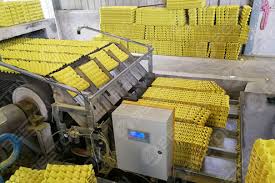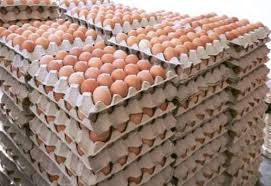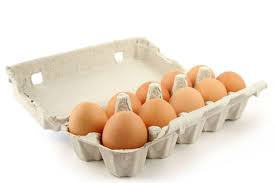![]()
If you’ve landed on this article page, you’re probably searching for a
good business idea—an idea that’s light on the pocket but heavy on
returns, promising both a fulfilling journey and potential profit.
|
How to start
Egg Crate Production From
Waste Paper In Nigeria
Egg cartons market has wide applications due to the booming
demand for poultry products. An important factor that affects
the growth of poultry products is the requirement of safety in
storing and distribution of eggs.
With the use of new technology and tools, the quality and safety
of eggs can be maintained through shock and stress absorbing
packaging systems. Egg cartons are broadly used across the globe
for packaging of eggs.
Over the past few years, egg cartons market has been one of the
fastest growing markets supplying packaging solution to the
global food & beverages industry. The primary driver in global
egg carton packaging market is the convenience in carrying and
transporting of eggs. Egg carton manufacturers also implement
various innovative ideas for the safe transportation of eggs.
The primary source of raw material for production of paper is
vegetable fibers, obtained mainly from plants. To ensure that
the forest is not depleted of these woods, there is need to
provide alternative source of raw materials, this therefore
leads to the invention of the process of recycling.
Why is Molded Fiber a Great Choice for Egg Cartons?
Let’s take a look at what makes molded fiber a great choice for
manufacturing egg cartons.
Sustainability and Eco-Friendliness
Molded fiber stands as a testament to environmental
consciousness. Composed of water, recycled paper, and natural
additives, it offers a sustainable alternative to traditional
packaging materials. Its manufacturing process minimizes waste
and energy consumption, making it a choice that aligns with the
global push for greener practices.
Applications Beyond Egg Cartons
Beyond safeguarding eggs, molded fiber finds applications in
various industries. From food packaging to protective casings
for delicate items, its versatility makes it an attractive
choice for businesses aiming to reduce their environmental
footprint.
Pulping Process
Once the raw materials are chosen, they undergo a pulping
process, transforming them into a slurry. This slurry becomes
the foundation for molded fiber products, emphasizing the
material's commitment to utilizing recycled resources.
Molding Techniques
The molding phase is a critical step in shaping the slurry into
specific forms. Different techniques are employed, ensuring
precision and product integrity. This stage highlights the
adaptability of molded fiber in creating diverse products with
unique shapes and sizes.
How are Molded Fiber Egg Cartons Made?
Let’s now jump into the process of making molded fiber egg
cartons.
Egg carton production
Fiber Molding for Cartons
The creation of molded fiber egg cartons involves precision in
molding to achieve the desired carton shapes. This step
optimizes protection for eggs, ensuring they remain intact
during transportation and storage.
Drying and Finishing
After molding, the cartons go through drying and finishing
stages. These are pivotal for enhancing the durability and
quality of the final egg carton product. Proper drying ensures
that the cartons maintain their structure and integrity.
Quality Control Measures
To meet industry standards, rigorous quality control measures
are implemented throughout the manufacturing process. These
measures guarantee the reliability and safety of molded fiber
egg cartons, providing consumers with a trustworthy and
eco-friendly packaging solution.
Materials Needed: Waste paper (newspapers, cardboard, or any
paper product without a glossy coating)
Blender or food processor, Water, Large basin or container, Wire
mesh or fine mesh screen, Old towel or cloth, Wooden frame (size
of the desired egg carton), Stapler or strong adhesive
Instructions: Collect Waste Paper: Gather a sufficient amount of
waste paper, such as old newspapers or cardboard boxes. Avoid
using paper with glossy coatings, as they may not break down as
well during the pulping process.
Tear the Paper: Tear the waste paper into small pieces to
facilitate the pulping process.
Create Pulp: In batches, place the torn paper pieces into a
blender or food processor, adding enough water to cover the
paper. Blend the mixture until it forms a smooth pulp
consistency. The water helps break down the paper fibers,
creating a pulp that can be molded into the egg carton shape.
Prepare the Basin: Fill a large basin or container with water.
Add the paper pulp to the water and mix thoroughly to ensure an
even distribution.
Make the Egg Carton Mold: Construct the egg carton mold by
taking a wooden frame and covering it with the wire mesh or fine
mesh screen. This will create the shape of your egg carton.
Dip and Form: Dip the wooden frame with the mesh into the paper
pulp mixture, making sure the entire mesh is covered with pulp.
Allow excess water to drain off.
Drain and Dry: Place the frame with the pulp on an old towel or
cloth to further drain excess water. Press gently to remove any
remaining water.
Mold the Carton: Carefully remove the wire mesh-covered frame,
leaving the molded egg carton shape on the cloth. Use your
fingers to gently shape and smooth the pulp to form the egg
compartments.
Dry the Carton: Allow the egg carton to air dry completely. This
may take a few days, depending on the humidity and thickness of
the pulp. Ensure it is thoroughly dry before moving to the next
step.
Secure the Carton: Once dry, carefully detach the egg carton
from the cloth. If necessary, reinforce the carton's edges and
corners with staples or strong adhesive to ensure it holds its
shape.
Congratulations! You have now successfully made egg cartons from
waste paper. These eco-friendly and reusable egg cartons can be
used to store and transport eggs while reducing the need for
single-use packaging. Additionally, you've contributed to
recycling and sustainability by repurposing waste paper into a
useful and practical product.
The entire manufacturing process only requires an automated egg
tray machine and a factory space with adequate electricity and
water supply. Egg tray-making machines that use interchangeable
molds are highly versatile and have several applications,
enabling manufacturers to produce multi-cavity egg cartons, egg
and fruit trays, cup carriers, and seed pots. Thus, with the
same machinery and raw material, you can manufacture a wide
range of customized packaging options for various clients,
boosting your firm’s profitability.
Besides, minimum manual labor is needed for the manual
classification of the waste, supervising the manufacturing
process, and controlling the critical parameters, namely the
temperature, the humidity, and the velocity (flow rate) of the
hot air.
Entrepreneurs looking to venture into the egg tray-making
business can use the latest technology, namely robotics and
smart automation to offer cost-effective, high-performance, and
aesthetically-appealing packaging solutions to their target
customers, earning a steady ROI in the long term.
Get our Practical Training Guide on Egg Crate Manufacturing
Business in Nigeria. For those of you looking to take advantage
of the rising demand for high quality, biodegradable egg
cartons, You can contact us. Not only are we market leaders in
manufacturing the machinery and spare parts your production unit
will need to manufacture molded fiber egg cartons, our experts
can offer you turnkey solutions, effectively setting up your
production plant and getting it fully operational for you.
|







